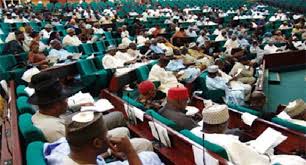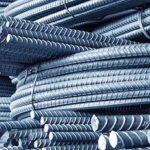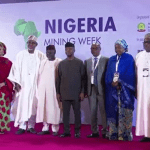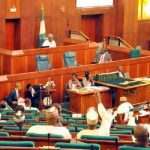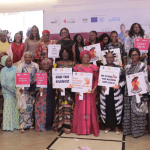 Lawmakers have been asked by Operators in the iron and steel sub sector, to conclude work on the Metallurgical Industry Bill, for Presidential assent.
Lawmakers have been asked by Operators in the iron and steel sub sector, to conclude work on the Metallurgical Industry Bill, for Presidential assent.
This was the consensus at the end of the annual metallurgical conference, aimed at chatting a new course for the sub sector.
TVC News Correspondent, Joke Adisa reports that the discovery of iron ore deposits in old Kwara now Kogi state in the 1950s led Nigeria to begin active planning and mapping of strategies for local production of iron rods and steel.
The construction of various rolling mills followed and between 1979 and 1983, the Nigerian authorities began using iron and steel to develop and
drive local production of goods.
The creation of the Ajaokuta Steel Company and the Aladja Steel Complex energised the sector as the government targeted reduction in demand of
foreign currency used towards the importation of steel products.
At this second edition of the Metallurgical conference, operators lament the decline in fortunes of the sub sector, leading to mass unemployment
More significantly, they want the Metallurgical Industry Bill passed and assented to by the President, after assent was declined in 2015.
Participants underscore the place of the proposed law in revitalising the industry
The conference with the theme ‘Development of Nigeria’s Metal Sector: Panacea for National Development and Imperative for Economic
Diversification’ is put together to generate realistic policies that will facilitate growth in the sector.
 Lawmakers have been asked by Operators in the iron and steel sub sector, to conclude work on the Metallurgical Industry Bill, for Presidential assent.
Lawmakers have been asked by Operators in the iron and steel sub sector, to conclude work on the Metallurgical Industry Bill, for Presidential assent.
This was the consensus at the end of the annual metallurgical conference, aimed at chatting a new course for the sub sector.
TVC News Correspondent, Joke Adisa reports that the discovery of iron ore deposits in old Kwara now Kogi state in the 1950s led Nigeria to begin active planning and mapping of strategies for local production of iron rods and steel.
The construction of various rolling mills followed and between 1979 and 1983, the Nigerian authorities began using iron and steel to develop and
drive local production of goods.
The creation of the Ajaokuta Steel Company and the Aladja Steel Complex energised the sector as the government targeted reduction in demand of
foreign currency used towards the importation of steel products.
At this second edition of the Metallurgical conference, operators lament the decline in fortunes of the sub sector, leading to mass unemployment
More significantly, they want the Metallurgical Industry Bill passed and assented to by the President, after assent was declined in 2015.
Participants underscore the place of the proposed law in revitalising the industry
The conference with the theme ‘Development of Nigeria’s Metal Sector: Panacea for National Development and Imperative for Economic
Diversification’ is put together to generate realistic policies that will facilitate growth in the sector.
 Lawmakers have been asked by Operators in the iron and steel sub sector, to conclude work on the Metallurgical Industry Bill, for Presidential assent.
Lawmakers have been asked by Operators in the iron and steel sub sector, to conclude work on the Metallurgical Industry Bill, for Presidential assent.
This was the consensus at the end of the annual metallurgical conference, aimed at chatting a new course for the sub sector.
TVC News Correspondent, Joke Adisa reports that the discovery of iron ore deposits in old Kwara now Kogi state in the 1950s led Nigeria to begin active planning and mapping of strategies for local production of iron rods and steel.
The construction of various rolling mills followed and between 1979 and 1983, the Nigerian authorities began using iron and steel to develop and
drive local production of goods.
The creation of the Ajaokuta Steel Company and the Aladja Steel Complex energised the sector as the government targeted reduction in demand of
foreign currency used towards the importation of steel products.
At this second edition of the Metallurgical conference, operators lament the decline in fortunes of the sub sector, leading to mass unemployment
More significantly, they want the Metallurgical Industry Bill passed and assented to by the President, after assent was declined in 2015.
Participants underscore the place of the proposed law in revitalising the industry
The conference with the theme ‘Development of Nigeria’s Metal Sector: Panacea for National Development and Imperative for Economic
Diversification’ is put together to generate realistic policies that will facilitate growth in the sector.
 Lawmakers have been asked by Operators in the iron and steel sub sector, to conclude work on the Metallurgical Industry Bill, for Presidential assent.
Lawmakers have been asked by Operators in the iron and steel sub sector, to conclude work on the Metallurgical Industry Bill, for Presidential assent.
This was the consensus at the end of the annual metallurgical conference, aimed at chatting a new course for the sub sector.
TVC News Correspondent, Joke Adisa reports that the discovery of iron ore deposits in old Kwara now Kogi state in the 1950s led Nigeria to begin active planning and mapping of strategies for local production of iron rods and steel.
The construction of various rolling mills followed and between 1979 and 1983, the Nigerian authorities began using iron and steel to develop and
drive local production of goods.
The creation of the Ajaokuta Steel Company and the Aladja Steel Complex energised the sector as the government targeted reduction in demand of
foreign currency used towards the importation of steel products.
At this second edition of the Metallurgical conference, operators lament the decline in fortunes of the sub sector, leading to mass unemployment
More significantly, they want the Metallurgical Industry Bill passed and assented to by the President, after assent was declined in 2015.
Participants underscore the place of the proposed law in revitalising the industry
The conference with the theme ‘Development of Nigeria’s Metal Sector: Panacea for National Development and Imperative for Economic
Diversification’ is put together to generate realistic policies that will facilitate growth in the sector.
 Lawmakers have been asked by Operators in the iron and steel sub sector, to conclude work on the Metallurgical Industry Bill, for Presidential assent.
Lawmakers have been asked by Operators in the iron and steel sub sector, to conclude work on the Metallurgical Industry Bill, for Presidential assent.
This was the consensus at the end of the annual metallurgical conference, aimed at chatting a new course for the sub sector.
TVC News Correspondent, Joke Adisa reports that the discovery of iron ore deposits in old Kwara now Kogi state in the 1950s led Nigeria to begin active planning and mapping of strategies for local production of iron rods and steel.
The construction of various rolling mills followed and between 1979 and 1983, the Nigerian authorities began using iron and steel to develop and
drive local production of goods.
The creation of the Ajaokuta Steel Company and the Aladja Steel Complex energised the sector as the government targeted reduction in demand of
foreign currency used towards the importation of steel products.
At this second edition of the Metallurgical conference, operators lament the decline in fortunes of the sub sector, leading to mass unemployment
More significantly, they want the Metallurgical Industry Bill passed and assented to by the President, after assent was declined in 2015.
Participants underscore the place of the proposed law in revitalising the industry
The conference with the theme ‘Development of Nigeria’s Metal Sector: Panacea for National Development and Imperative for Economic
Diversification’ is put together to generate realistic policies that will facilitate growth in the sector.
 Lawmakers have been asked by Operators in the iron and steel sub sector, to conclude work on the Metallurgical Industry Bill, for Presidential assent.
Lawmakers have been asked by Operators in the iron and steel sub sector, to conclude work on the Metallurgical Industry Bill, for Presidential assent.
This was the consensus at the end of the annual metallurgical conference, aimed at chatting a new course for the sub sector.
TVC News Correspondent, Joke Adisa reports that the discovery of iron ore deposits in old Kwara now Kogi state in the 1950s led Nigeria to begin active planning and mapping of strategies for local production of iron rods and steel.
The construction of various rolling mills followed and between 1979 and 1983, the Nigerian authorities began using iron and steel to develop and
drive local production of goods.
The creation of the Ajaokuta Steel Company and the Aladja Steel Complex energised the sector as the government targeted reduction in demand of
foreign currency used towards the importation of steel products.
At this second edition of the Metallurgical conference, operators lament the decline in fortunes of the sub sector, leading to mass unemployment
More significantly, they want the Metallurgical Industry Bill passed and assented to by the President, after assent was declined in 2015.
Participants underscore the place of the proposed law in revitalising the industry
The conference with the theme ‘Development of Nigeria’s Metal Sector: Panacea for National Development and Imperative for Economic
Diversification’ is put together to generate realistic policies that will facilitate growth in the sector.
 Lawmakers have been asked by Operators in the iron and steel sub sector, to conclude work on the Metallurgical Industry Bill, for Presidential assent.
Lawmakers have been asked by Operators in the iron and steel sub sector, to conclude work on the Metallurgical Industry Bill, for Presidential assent.
This was the consensus at the end of the annual metallurgical conference, aimed at chatting a new course for the sub sector.
TVC News Correspondent, Joke Adisa reports that the discovery of iron ore deposits in old Kwara now Kogi state in the 1950s led Nigeria to begin active planning and mapping of strategies for local production of iron rods and steel.
The construction of various rolling mills followed and between 1979 and 1983, the Nigerian authorities began using iron and steel to develop and
drive local production of goods.
The creation of the Ajaokuta Steel Company and the Aladja Steel Complex energised the sector as the government targeted reduction in demand of
foreign currency used towards the importation of steel products.
At this second edition of the Metallurgical conference, operators lament the decline in fortunes of the sub sector, leading to mass unemployment
More significantly, they want the Metallurgical Industry Bill passed and assented to by the President, after assent was declined in 2015.
Participants underscore the place of the proposed law in revitalising the industry
The conference with the theme ‘Development of Nigeria’s Metal Sector: Panacea for National Development and Imperative for Economic
Diversification’ is put together to generate realistic policies that will facilitate growth in the sector.
 Lawmakers have been asked by Operators in the iron and steel sub sector, to conclude work on the Metallurgical Industry Bill, for Presidential assent.
Lawmakers have been asked by Operators in the iron and steel sub sector, to conclude work on the Metallurgical Industry Bill, for Presidential assent.
This was the consensus at the end of the annual metallurgical conference, aimed at chatting a new course for the sub sector.
TVC News Correspondent, Joke Adisa reports that the discovery of iron ore deposits in old Kwara now Kogi state in the 1950s led Nigeria to begin active planning and mapping of strategies for local production of iron rods and steel.
The construction of various rolling mills followed and between 1979 and 1983, the Nigerian authorities began using iron and steel to develop and
drive local production of goods.
The creation of the Ajaokuta Steel Company and the Aladja Steel Complex energised the sector as the government targeted reduction in demand of
foreign currency used towards the importation of steel products.
At this second edition of the Metallurgical conference, operators lament the decline in fortunes of the sub sector, leading to mass unemployment
More significantly, they want the Metallurgical Industry Bill passed and assented to by the President, after assent was declined in 2015.
Participants underscore the place of the proposed law in revitalising the industry
The conference with the theme ‘Development of Nigeria’s Metal Sector: Panacea for National Development and Imperative for Economic
Diversification’ is put together to generate realistic policies that will facilitate growth in the sector.

